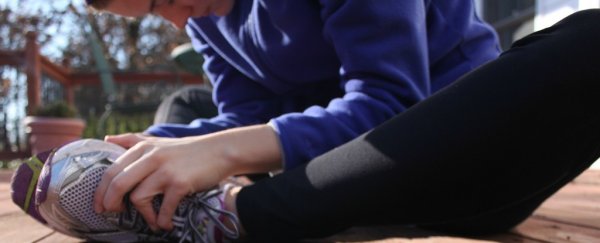Biologists from the UK have found evidence that our circadian rhythms are causing us to feel stiffer in the morning than we do at any other time of day.
This means that our stiffness isn't simply from laying still for hours, but a biological response that's dictated by how our bodies repress inflammation during the night.
To investigate the phenomenon of morning stiffness, researchers from the University of Manchester induced arthritis in mice by injecting their joints with collagen. They then observed how the arthritic joints inflamed over the course of the day, finding that different hours of the day produced different results.
During the night cycle – which the researchers controlled with a series of lights – the mice experienced very little inflammation, and inflammatory markers were reduced. But after the lights were turned back to simulate daytime, the paws of the arthritic mice were significantly more swollen.
The team says these differences in inflammation stem from specific cells inside mouse joints called fibroblast-like synoviocytes (FLS), which run on a 24-hour cycle, similar to our own body clocks.
These dictate the amount of inflammation, and therefore pain, the mice experienced in their joints by producing certain proteins.
To confirm their findings in something that's not affected by arthritis, the team worked with cultured mouse FLS cells, removing the 'clock proteins' that regulate the day/night cycle to see what would happen.
As it turned out, the cells stayed inflamed throughout the day without this clock mechanism.
The researchers then injected the mouse cells with a drug that triggered the same anti-inflammatory proteins that the FLS cells typically do, which ended up reducing inflammation markers. They did the same with cultured human FLS cells, and saw the same results.
These findings suggest that inflammation is caused by a series of complex biological systems that work together to create a daily cycle.
At night, inflammation drops – though the team doesn't speculate on why – and slowly ramps up during the day. It will take further study to understand why these systems are in place.
"This study reminds us that inflammation, typically thought of as chronic and brittle, can, in fact, be nuanced – in this case, under the influence of the brain's suprachiasmatic nucleus, which controls the body's circadian physiology," said Thoru Pederson, editor-in-chief of The FASEB Journal, where the team published their work. Pederson wasn't part of the research team.
It's important to note that, so far, the team has only shown that cultured human FLS cells use the biological clock to produce anti-inflammatory proteins - they haven't experimentally shown that this is affecting live humans, as they did with mice.
But if these results do hold up to further human testing, the findings might lead researchers toward a better treatment for inflammatory diseases like chronic arthritis.
"By understanding how the biological clock regulates inflammation, we can begin to develop new treatments, which might exploit this knowledge," said one of the team, Julie Gibbs. "[B]y adapting the time of day at which current drug therapies are administered, we may be able to make them more effective."
In the meantime, the findings could also finally explain why we feel so stiff and crappy in the morning: our bodies are slowly becoming more inflamed, causing us to stretch and feel tight as the morning ticks away.
The good news is that our bodies naturally reduce this inflammation when we sleep at night, allowing us to get better rest.
